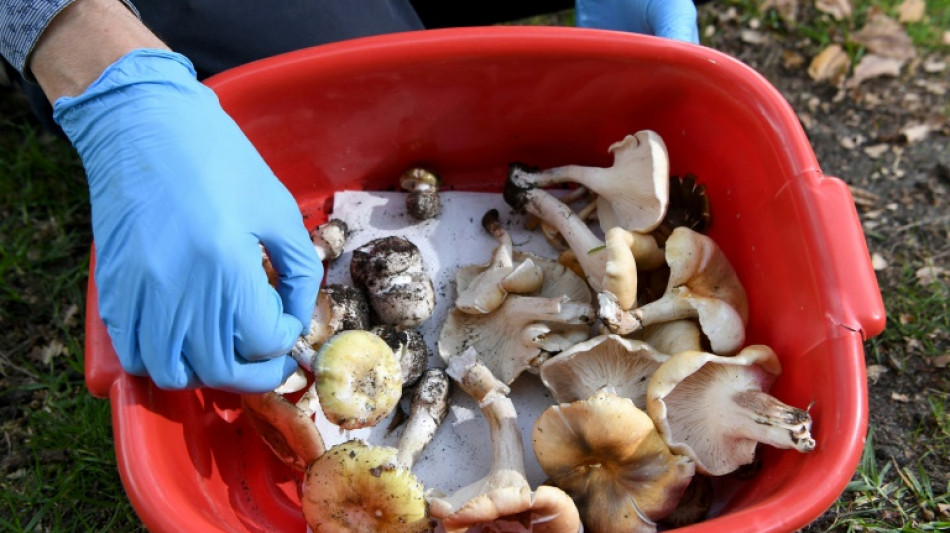
-
 US Republicans begin push to hold Clintons in contempt over Epstein
US Republicans begin push to hold Clintons in contempt over Epstein
-
Trump says agreed 'framework' for US deal over Greenland

-
 Algeria's Zidane and Belghali banned over Nigeria AFCON scuffle
Algeria's Zidane and Belghali banned over Nigeria AFCON scuffle
-
Iran says 3,117 killed during protests, activists fear 'far higher' toll

-
 Atletico frustrated in Champions League draw at Galatasaray
Atletico frustrated in Champions League draw at Galatasaray
-
Israel says struck Syria-Lebanon border crossings used by Hezbollah
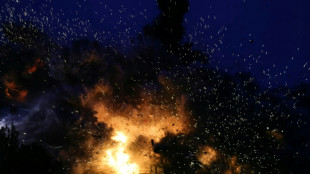
-
 Snapchat settles to avoid social media addiction trial
Snapchat settles to avoid social media addiction trial
-
'Extreme cold': Winter storm forecast to slam huge expanse of US
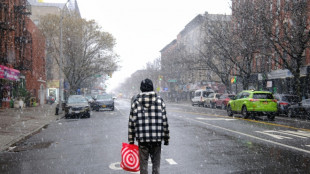
-
 Jonathan Anderson reimagines aristocrats in second Dior Homme collection
Jonathan Anderson reimagines aristocrats in second Dior Homme collection
-
Former England rugby captain George to retire in 2027

-
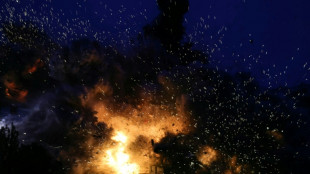 Israel launches wave of fresh strikes on Lebanon
Israel launches wave of fresh strikes on Lebanon
-
Ubisoft unveils details of big restructuring bet

-
 Abhishek fireworks help India beat New Zealand in T20 opener
Abhishek fireworks help India beat New Zealand in T20 opener
-
Huge lines, laughs and gasps as Trump lectures Davos elite

-
 Trump rules out 'force' against Greenland but demands talks
Trump rules out 'force' against Greenland but demands talks
-
Stocks steadier as Trump rules out force to take Greenland

-
 World's oldest cave art discovered in Indonesia
World's oldest cave art discovered in Indonesia
-
US hip-hop label Def Jam launches China division in Chengdu

-
 Dispersed Winter Olympics sites 'have added complexity': Coventry
Dispersed Winter Olympics sites 'have added complexity': Coventry
-
Man City players to refund fans after Bodo/Glimt debacle

-
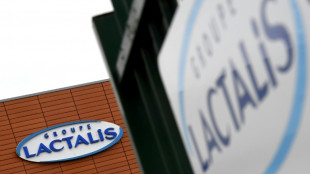 France's Lactalis recalls baby formula over toxin
France's Lactalis recalls baby formula over toxin
-
Pakistan rescuers scour blaze site for dozens missing

-
 Keenan return to Irish squad boosts Farrell ahead of 6 Nations
Keenan return to Irish squad boosts Farrell ahead of 6 Nations
-
US Treasury chief accuses Fed chair of 'politicising' central bank

-
 Trump rules out force against Greenland but demands 'immediate' talks
Trump rules out force against Greenland but demands 'immediate' talks
-
Israeli strike kills three Gaza journalists including AFP freelancer

-
 US Congress targets Clintons in Epstein contempt fight
US Congress targets Clintons in Epstein contempt fight
-
Huge lines, laughs and gasps as Trump addresses Davos elites

-
 Trump at Davos demands 'immediate' Greenland talks but rules out force
Trump at Davos demands 'immediate' Greenland talks but rules out force
-
Australia pauses for victims of Bondi Beach shooting

-
 Prince Harry says tabloid coverage felt like 'full blown stalking'
Prince Harry says tabloid coverage felt like 'full blown stalking'
-
Galthie drops experienced trio for France's Six Nations opener

-
 Over 1,400 Indonesians leave Cambodian scam groups in five days: embassy
Over 1,400 Indonesians leave Cambodian scam groups in five days: embassy
-
ICC rejects Bangladesh's plea to play T20 World Cup matches outside India

-
 Prince Harry says UK tabloid court battle in 'public's interest'
Prince Harry says UK tabloid court battle in 'public's interest'
-
Trump lands in Davos to push Greenland claims

-
 Balkan wild rivers in steady decline: study
Balkan wild rivers in steady decline: study
-
Injured Capuozzo misses out on Italy Six Nations squad

-
 Mourners pay last respects to Italian icon Valentino
Mourners pay last respects to Italian icon Valentino
-
EU parliament refers Mercosur trade deal to bloc's top court

-
 Odermatt seeks first Kitzbuehel victory with eye on Olympics
Odermatt seeks first Kitzbuehel victory with eye on Olympics
-
Italy's Brignone to be rested for Spindleruv Mlyn giant slalom

-
 Alcaraz spearheads big names into Australian Open third round
Alcaraz spearheads big names into Australian Open third round
-
European stocks dip ahead of Trump's Davos speech

-
 Trump flies into Davos maelstrom over Greenland
Trump flies into Davos maelstrom over Greenland
-
EU won't ask Big Tech to pay for telecoms overhaul

-
 Railway safety questioned as Spain reels from twin train disasters
Railway safety questioned as Spain reels from twin train disasters
-
Marcell Jacobs back with coach who led him to Olympic gold

-
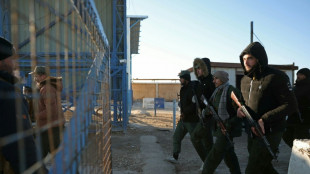 Syria army enters Al-Hol camp holding relatives of jihadists: AFP
Syria army enters Al-Hol camp holding relatives of jihadists: AFP
-
Brook apologises, admits nightclub fracas 'not the right thing to do'


The making of Australia's mushroom murders
Australian Erin Patterson served a beef Wellington lunch that was "delicious" by all accounts, using eye fillet steak, flakey golden pastry, and the deadliest mushrooms known to man.
The keen home cook murdered her husband's parents and aunt in 2023 by spiking their sumptuous Saturday lunch with death cap mushrooms, a jury found on Monday.
For more than two months Patterson's trial has been followed around the world, the sense of intrigue fuelled by her choice of dish, method of murder, and the mystery of her motive.
The courtroom spectacle has been dubbed Australia's "trial of the century".
Patterson, 50, hosted the intimate family lunch at her tree-shaded home in the farming village of Leongatha on July 29, 2023.
The mother-of-two planned a menu to match what she said was a "special" occasion, dishing up beef Wellington, green beans, mashed potatoes and gravy.
Joining her that afternoon were Don and Gail Patterson, the elderly parents of her long-estranged husband Simon.
Simon's maternal aunt Heather Wilkinson and her husband Ian, a well-known pastor at the local Baptist church, rounded out the group.
Patterson was disappointed husband Simon refused to come because he felt "uncomfortable".
Still legally married, their once-cordial relationship was showing signs of strain.
"I hope you'll change your mind," she texted in reply, to no avail.
- 'Delicious and beautiful' -
Patterson forked out for expensive cuts of fillet steak, slathering the meat in minced mushrooms before coating it in pastry to make individual parcels of baked beef Wellington.
Death cap mushrooms are easily mistaken for other edible varieties and reportedly possess a sweet taste that belies their potent toxicity.
The guests gobbled up so much of the deadly feast they had little appetite for the cake laid out as dessert, the trial heard.
As they ate, Patterson told the group she had cancer and needed help telling her children, Pastor Ian recalled during the trial.
The group prayed and asked for "God's blessing on Erin".
Heather later raved about the food, telling a friend it was "delicious and beautiful".
Even as the first waves of sickness wracked her body, she could find no fault with the cooking.
"I did ask Heather what the beef Wellington tasted like and she said it was delicious," doctor Christopher Webster told the trial.
But the guests' blood was soon coursing with deadly amatoxin, a potent poison produced by death cap mushrooms to ward off hungry forest critters.
Don, Gail and Heather died of organ failure within a week.
Ian was the only guest to survive.
- Death cap country -
A humble weatherboard building knocked together in 1895, the lives of Patterson and her victims in many ways revolved around the Korumburra Baptist Church.
Ian was the long-serving pastor, preaching to a small but hardy flock every Sunday.
Patterson was less devout but still helped livestream the church's services on social media.
A short drive from the neat church yard lies the local cemetery, a plot of land framed by grazing cattle and gently sloping hills.
Plastic pink and white flowers mark the graves of Don and Gail almost two years since they were buried.
"Just remember that death is not the end," reads a plaque for the couple.
It is a swathe of rural Australia well known for its lush woodlands and verdant native forests.
And it is exactly the sort of damp, fertile place where death cap mushrooms -- or Amanita phalloides -- freely sprout in the wild.
Blamed for 90 percent of the world's fungus-related fatalities, a single mushroom contains enough poison to send the liver into catastrophic failure.
- 'Super sleuth' -
Described as witty and intelligent, Patterson was a devoted mother, an avid book collector and a cooking enthusiast.
She was a busy cog in her tight-knit community, volunteering to edit the village newsletter.
Patterson was also a true crime buff, joining a Facebook group to chew over details from infamous Australian murders.
Friend Christine Hunt told the trial Patterson had a reputation as "a bit of a super sleuth".
Patterson and husband Simon split in 2015, but did their best to stay on friendly terms.
By 2022, this once-cordial relationship had soured, marred by arguments over Simon's child support obligations.
Patterson told a friend her husband was "coercive", the trial heard.
She was frustrated her parents-in-law had refused to take her side in the dispute.
"I'm sick of this shit I want nothing to do with them," Patterson wrote to a friend on Facebook several months prior to the lunch.
- 'I loved them' -
Almost 100 days passed between the beef-and-pastry feast and Patterson's arrest in early November 2023.
Patterson seemed to cooperate with the mounting investigation, attending police interviews, speaking with health officials and willingly handing over her phone and computers.
But detectives would soon uncover signs she dished up the meal with murderous intent.
Patterson lied about having ovarian cancer in a bid to lure the guests to her house, prosecutors told the trial after finding no medical records of the illness.
She also lied about owning a food dehydrator used to prepare the mushrooms, which police found at a nearby rubbish tip.
It tested positive for traces of death cap mushrooms.
Patterson suggested she accidentally bought the death caps at an Asian grocer near Melbourne.
Food safety officers found no sign of the shop.
Death cap sightings were posted on a nature-lovers' website months before Patterson baked the tainted dish.
Phone records suggested she may have visited these spots in the lead-up to the meal.
Before she was taken into custody, Patterson would tearfully speak to a crowd of journalists gathered outside her home.
"I am devastated. I loved them. I cannot believe this has happened and I am so sorry they have lost their lives."
- 'I lied' -
Patterson's trial was held in the nearby town of Morwell, a sedate hamlet better known for its yearly rose garden festival.
Crowds of journalists, podcasters, and true crime fans swarmed to catch a glimpse of what would soon be billed Australia's "trial of the century".
Newspapers from New York to New Delhi picked up every morsel of courtroom drama.
More than 50 witnesses spoke across eight full weeks of testimony: doctors, nurses, fungi experts, detectives, and Patterson's estranged husband.
Then, finally, the cook herself took the stand.
Patterson said she never intended to kill or harm the people she loved.
She admitted lying to police -- but only because she feared being blamed for a deadly accident.
"I agree that I lied because I was afraid I would be held responsible," she told the trial.
The jury took almost a full week of deliberations to judge Patterson guilty.
She will be sentenced at a later date.
Ian, the sole lunch survivor, sat through almost every hour of the trial.
When his time came to testify, he could offer no explanation for what drove Patterson to murder.
"When we met, things were friendly. We never had arguments or disputes," he said.
"She just seemed like an ordinary person."
M.Betschart--VB
